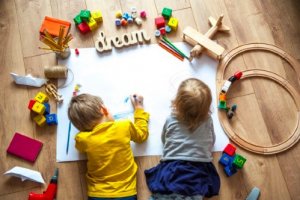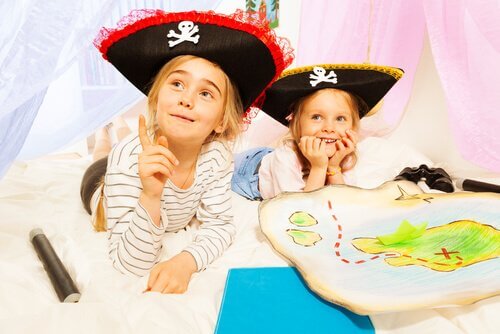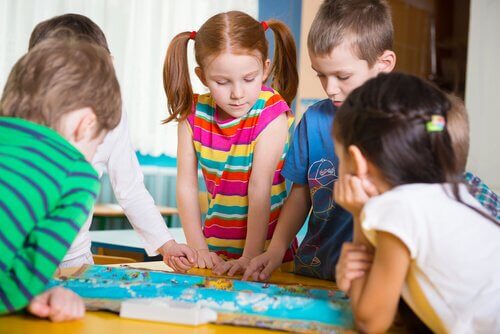Developmental Activities for Preschool Aged Children

The first few years of life provide the basis for children’s cognitive and social development. Planning developmental activities for preschool aged children is very important, as they foster a respect for rules as well as incentives to learn through play.
Both within the family sphere and in daycare centers, these developmental activities are essential. Whether they’re alone or in a group, children require attention and things to occupy them. Having a list of activities can be a lifesaver in many situations.
Developmental activities at home
Developmental activities: memory games
This activity begins with cutting up cardboard of a single color into several square cards. One one side, draw or glue on kid-friendly images. For example, if they choose superheroes, you’ll need two squares with the same design. You can use this game to help them learn letters, numbers, or other types of objects.
Once you’ve made the cards, place all of them face down. Taking turns, the children try to find the identical pairs. Each player turns over two cards at a time, and if they don’t match, he or she returns them to their initial position.
Treasure hunt
A classic that entertains adults and children alike. You can use infinite variations depending on the space, the participants, and what skills you want to emphasize. You can use boxes as treasure chests, or simply place the clues on pieces of paper hidden under objects.
The goal is to find the element that serves as the treasure. Ideally, it would be something that can be shared. Another option is to place a piece of paper with a word relating to a particular value inside the chest. This way, the team can discuss situations that reflect this value.

Simon Says
Among developmental activities for young children, Simon Says is a particularly dynamic option that promotes creativity. At first, it’s best if an adult plays the role of Simon. With the players standing silently, Simon gives them an instruction like, “Simon says stand on one leg.”
This fun game can help develop children’s motor skills. Later, each child can take turns giving the instructions. The changing of roles helps promote self-confidence and encourages them to use their imagination.
Obstacle course
If you have enough room, an obstacle course can make for a fun afternoon. The children work together to create a course filled with different objects serving as obstacles. You can use boxes, cushions, and dolls – basically, anything that isn’t dangerous.
Once the course is made, the children take their places. Taking turns, they move through the course timed by a stopwatch. This helps them develop dexterity, speed, and gross motor skills.
Drawing from stories
Everyone knows that children love to draw. In this activity, you tell them a short story with funny characters appropriate to their age. Then, you give them paper and colored pencils and ask them to recreate the story.
When they’re done with their drawings, the children get to talk about the moment or character they chose to illustrate. This is a great way to teach them about colors by going over which one they used.
The five senses
In different corners of a playroom, make five islands, each representing a different sense. When they reach an island, the children must identify the organ related to that sense.
Furthermore, the island of touch should include elements with different textures they can feel with their hands. The island of sight should feature colorful elements and encourage visualization. The other islands should represent their respective senses in a similar fashion.

Final recommendations for developmental activities
Using these simple guidelines will make the activities more enjoyable, orderly, and positive:
- Alternate between games that encourage the development of different abilities.
- Promote group participation and teamwork among the children.
- Always use background music or come up with simple songs for everyone to learn.
- Manage changes in roles so that everyone gets a turn in the lead role.
In conclusion, developmental activities for young children can be fun for everyone. You can even adapt the oldest games to modern times.
All cited sources were thoroughly reviewed by our team to ensure their quality, reliability, currency, and validity. The bibliography of this article was considered reliable and of academic or scientific accuracy.
- Castellar Arrieta, G. M., González Escorcia, S. L., Santana Ramírez, Y., & Coronado, L. A. (2015). Las actividades lúdicas en el proceso de enseñanza aprendizaje de los niños de preescolar del Instituto Madre Teresa de Calcuta (Doctoral dissertation, Universidad de Cartagena). http://repositorio.unicartagena.edu.co:8080/jspui/handle/11227/2106
- Elkonin DB. (1980). Psicología del juego. Madrid: Pablo del Río.
- Félix, E. M. R., Ruiz, R. O., & Monks, C. P. (2008). Impacto de la actividad lúdica en el desarrollo de la competencia social. International Journal of Psychology and Psychological Therapy, 8(2), 193-202. [PDF] unirioja.es
- Leseman PPM, Rollenberg L y Rispens J. (2001). Playing and working in kindergarten: Cognitive coconstruction in two educational situations. Early Childhood Research Quarterly, 16, 363-384.
- Moreno, C. X. G., Solovieva, Y., & Rojas, L. Q. (2009). La actividad de juego temático de roles en la formación del pensamiento reflexivo en preescolares. Magis, Revista Internacional de Investigación en Educación, 2(3). https://revistas.javeriana.edu.co/index.php/MAGIS/article/view/3407
- Ortega R. (1992). El juego infantil y la construcción social del conocimiento. Sevilla: Alfar. Ortega R
This text is provided for informational purposes only and does not replace consultation with a professional. If in doubt, consult your specialist.








